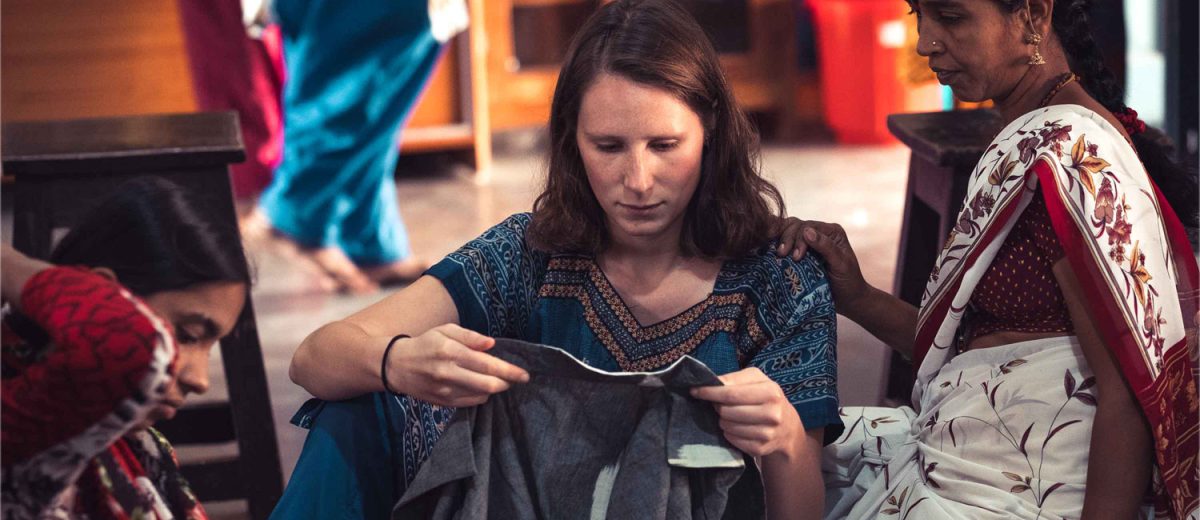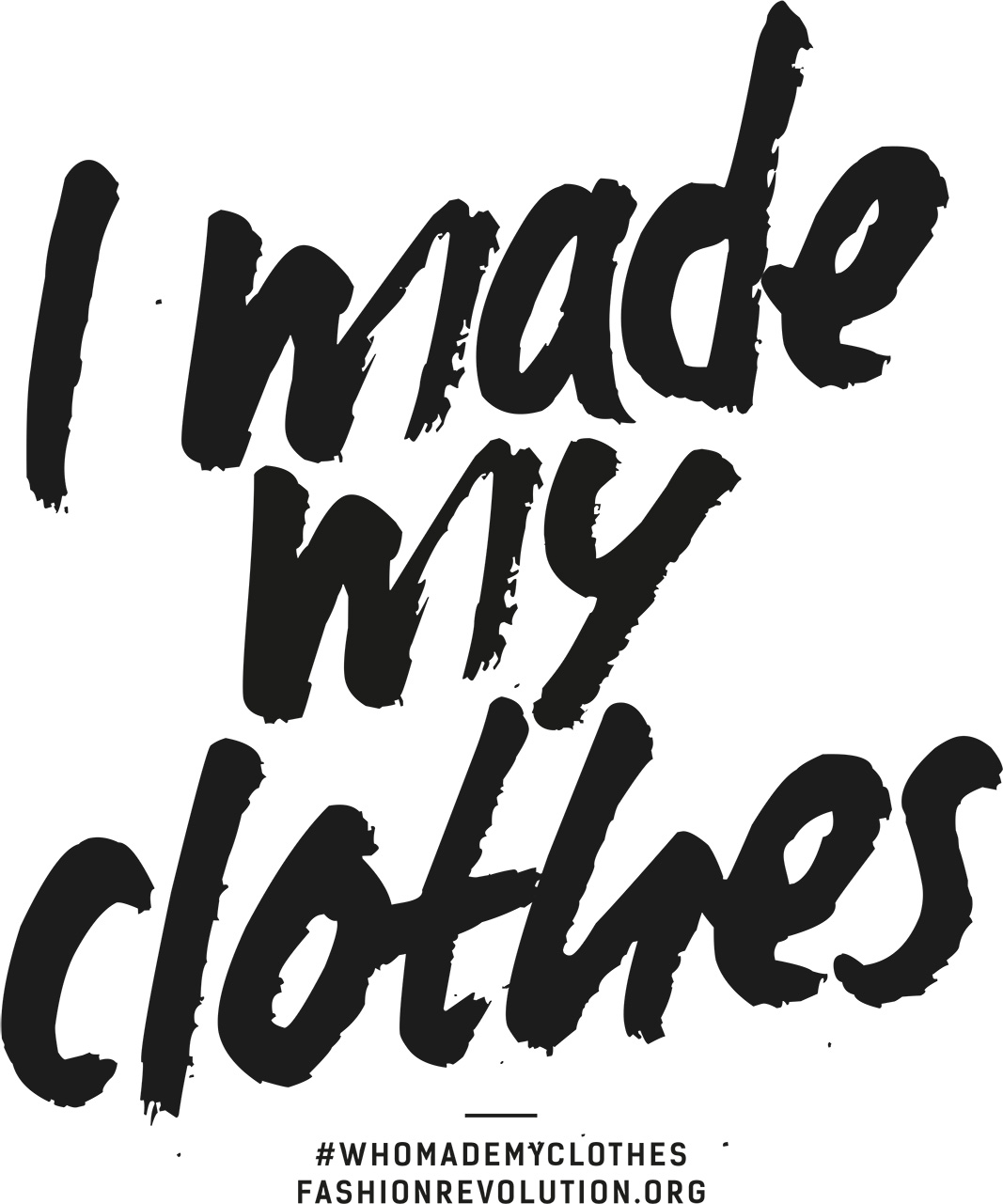>> in Deutsch
On the third day of the Fashion Revolution blog tour I would like to introduce you to a project that has its origins in Chittapur, India. Jeanine Glöyer, who was then 19 years old, spent her voluntary social year in Chittapur in 2008. During this time she built up a small sewing workshop in the Social Center “Jyoti Seva Kendra”, which means “Bringing Light to Someone”.
Actually conceived as a small project for disadvantaged women from the region, “Jyoti – Fair Works” has become a fashion label that, on the one hand, gives women from Chittapur a chance to live independently and, on the other hand produces fair and ecologically sustainable fashion.
I am very excited that Carolin Hofer, who is particularly concerned with the value chain and transparency of the products and maintains contacts with the traders, has answered a few questions.
** I would like to refer to the current issue of the magazine “Werde” titled “So fair is fashion now”. Here’s a long article about Jyoti that sheds light on all aspects of the multi-layered business. Or click over to the page of Jyoti, where you can also read more about what Jyoti achieves.
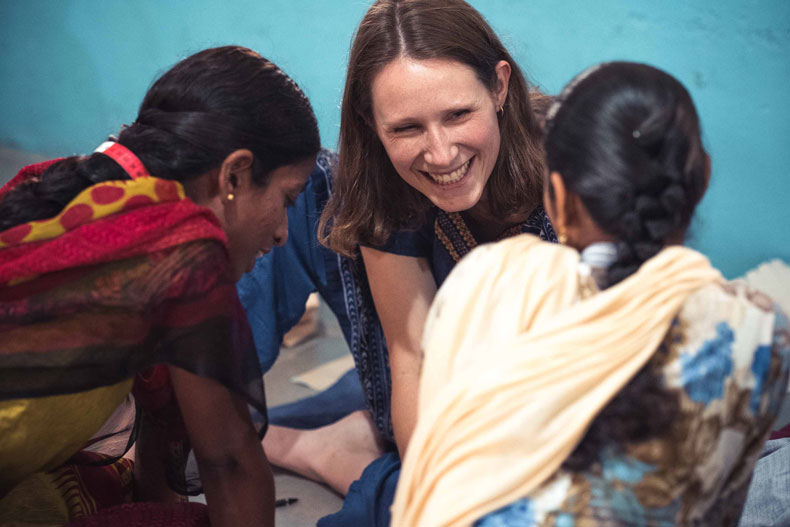
Interview with Carolin Höfer from “Jyoti – Fair Works”
I’ve been following Jyoti on Instagram for a while now and recently read a great article about you in the magazine “Verde”. Much (pioneer) work is in your project and certainly often frustrating moments. What keeps you going on and motivates you again and again to stay true to your principles?
Of course, it is sometimes frustrating to see still crowds of young people with Primark bags at Alexanderplatz in Berlin and of course we do not always run smoothly through all and have to beat up with late deliveries, the Indian Post, taxes and co. But all this is more than made good by the successes that we see on the other side. A huge motivator are our customers and their feedback. Every week we get so many lovingly written postcards and nice e-mails full of praise and enthusiasm, which give us an incredible amount of power. We always read those messages here in the office loudly and are convinced – we have the nicest customers in the world. And of course, working in India is incredibly motivating. This is watching how the women are getting better year by year. Also that they regard Jyoti as their business and that they have a huge interest in the “German Market” and feedback from our customers. However, this also includes realizing how the women are now working for the education of their daughters and that they recognize how important their daughters eduction is for their later life. And finally, there is the possibility for us to discover this great potential of India. Every year, we find new and beautiful materials such as Peace-Silk or wool or discover sophisticated weaving techniques such as Ikat or filigree pattern weaving. Then sometimes we just sit dreamily here in Berlin in front of a pile of fabrics and look forward to the collection one year in advance ,
Jyoti is not only a label for fair and sustainably produced clothing, but also a social project. So with the help of your studio and workshop in Chittapur you help women to become self-employed and to work in a good environment. Is your work getting around on the ground and can you strengthen the selfconsciousness of women so that they may demand certain conditions from other employees?
Yes, our work gets around! Chittapur is a small village and the NGO Jyoti Seva Kendra, with whom we work locally, is already well-known and well-respected for its work with women and children. We are constantly receiving applications from other women from the village, so working at Jyoti is definitely attractive to many. And yes, we can certainly boost self-confidence. Even the financial independence of their husbands or the important economic role they play now in the families. But also through the work outside the home, the interaction with cloth merchants and employees, these are also very important aspects for the women, who did previously mostly very low from home paid work, such as incense sticks. This all was enough reason for big changes in their self-perception. However, I think the most important effect on any future employment relationships is the skills that women acquire, both as seamstresses and in workshops about self-employment, bank accounts or saving money. So they can accept a good job as skilled workers and not already be pushed to bad working situations by the lack of skills.
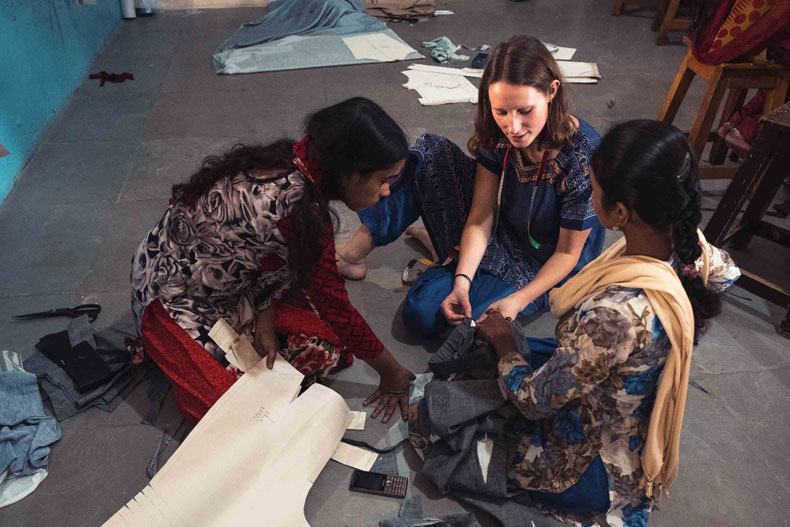
What is your relationship with the local women? Can you briefly describe how the work for the women at Jyoti is regulated and how you care for a good cooperation?
The relationship between us and women in India is very personal and familiar. They know Jeanine and me for many years and when we are in Indiy we work very closely together every day. In addition, many problems are discussed (and solved) in the group, because everyone knows about the life situation of the other. Jyoti is clearly perceived as a project or a business in which we all work together. The Indian and German teams are equal partners who have a lot of responsibilities to do their jobs properly. They do the sewing and we design and sale 🙂
The women start working at 10 am every morning, then they have an hour for lunch at 1 pm and work from 2 pm to 5 pm in the afternoon. We have set the times together with the women, tailored to their other obligations at home and other needs. If they do not have time, they can of course take off, it’s very spontaneous and often happens, as there are many family festivals and religious holidays in India. The women coordinate between each other and we don’t interfere.
Earlier, now only from time to time, they have another hour break with English lessons after the lunch break. Meanwhile, the women speak English very well and new employees to learn very quickly from the others and through the exchange with us. The training of new employees is also regulated by the group. The older, more experienced then practice with the new, until the garments withstand their quality inspection. And of course, there are no limits in training, together we are constantly working on new cutting concepts and doing workshops on special sewing techniques or on topics such as independence, investment, etc when we are in India… In addition to these “professional” incentives, we offer the Women, interest-free and subsidized loans, for private investment in health or education, and for example carry out regular health check-ups.
The fabrics for your collections are beautiful and all hand-woven by small family businesses or cooperatives. You strictly want to have the overview of all supply chains and inspect your suppliers personally. In addition, you ensure that the money really arrives at the weavers. How do you do this?
Thank you very much for the compliment! 🙂 Yeah right, we all know the fabric dealers very well and just like the women, we have a very personal relationship with many of them. At least once a year I go to India to check and select fabrics, schedule the upcoming deliveries, discovering new weaving techniques and yes – also for getting together and just chai drinking with the traders. The traders are often small cooperatives of weavers or family businesses who have often joined together with neighbours. By being in direct contact with them and not engaging middlemen or outsourcing the procurement of the fabrics, we make sure that the money we pay does not end up in the pockets of any intermediaries, but directly in these of the weaver.
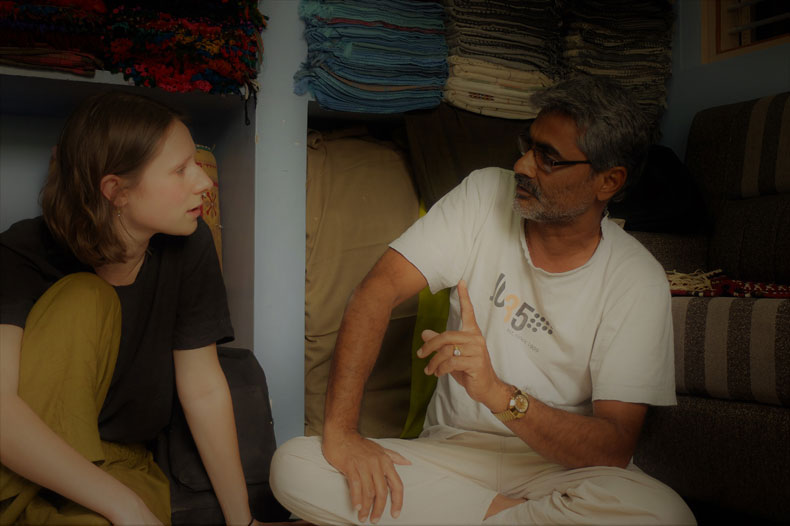
Who designs the collections for Jyoti and what is important to you in the designs?
We take over the design ourselves and is one of our favorite tasks 🙂 Always in January and July we come together to gather first ideas for the collection for the upcoming year and in the following weeks and months we work these vague ideas out to concrete cuts and finally specimens. Jeanine and I both have no background in design or pattern techniques. Of course we learned a lot working at Jyoti, but not as professional as we want our clothes;) At this point we get expert support. Since last summer Mareike joined us as a team, she studied fashion design and can create patterns out of our ideas. With these patterns we then travel to India and introduce them to the women. Concerning the designs we try to pay attention to everything that can make our products more sustainable. Of course, we do not want to chase after trends that are no longer fashionable after a few months, but rather design as timeless cuts as possible. This includes the timelessness in a year of time, for example. summerdresses, that can be combined in the winter with long turtleneck and boots. Or cuts that can be adapted to different figures, like tied or wrapped. At the same time, we try to greatly reduce or optimally avoid the waste that occurs during cutting. In the last few weeks, Mareike has done some “puzzle-wonders”, and in summer 2019 collection, we will be introducing two Zero-Waste products for which we will not throw away a single centimeter of fabric after cut. And of course the pieces should look nice in the end, I probably do not have to mention … Concerning this we rely mostly on our own taste and think about what we would like to have in the closet next year 🙂
What has changed in your own everyday lifestyle since you started working with Jyoti?
I think you mean in relation to our own shopping behavior ?! I would say that we were all even before Jyoti very conscious consuming people and have perhaps therefore come together;) Nevertheless through our work we are sensitized each day for the impact of our consumption and at the same time it motivates us to do differently. I can only speak for myself but a concrete change would be, for example, shopping at other Fair Trade labels. That may sound weird at first – should I not do that anyway? – but for a long time I only bought second-hand clothes and honestly 95% of my clothes are still from flea markets. But working on Jyoti has brought many other small labels to the stage, and because you know how important the work is they do, how it matters, and where the money goes if you pay 150 € for a dress with a heavy heart I also do this now. In any case, I have become much more radical in my views and much stricter with myself in the general question of what I really need.
Jyoti has been around for a few years now. Can you see a change towards what we are calling “less is more” and how would you describe your customers?
Yes, surly. Jyoti started in 2010 as a small project and in 2014 we officially founded the company and sold the first clothing collection in summer. “Less is more” should of course be at the top of the list of principles for every Fair Trade label, and we realize this slow fashion approach through small and few collections, good quality that stands for durable products and through encouraging our customers to value and to acknowledge the garments and then to deal with them accordingly well, if necessary to repair, etc. By the feedback we get from our customers, we can assume that this idea is quite important. Sometimes we also get emails asking if we can quickly sew down worn buttons, shorten trousers or close a seam that has risen up. Of course, since we almost exclusively sell online, it is difficult to judge to what extent our customers actually made a conscious decision to consume less, or simply think that our products ate beautiful and hang them in the closet next to 70 other pieces;) But I think that the very fact the price for fair fashion requires a certain understanding of “less is more”. And, more concretely, through personal contact with customers, we also clearly notice that the interest in global supply chains and transparency in the (fashion) industry is increasing! Many customers drive us up the wall to really get an accurate picture of each step in the value chain. I think that must somehow result in appreciation for the work behind it .. 🙂
What do you really want for the future of your company?
Phew, that’s a big question … and sometimes we just hum and haw with saying “let’s see” to us…J But of course we already have some concrete goals. First of all, we want to keep growing. Demand for our products has increased steadily in recent years, and especially since this spring, a wave of enthusiastic customers is flooding us, leaving us barely able to keep up with production. The next steps would be to expand our team in India and hire more women. Since we can reach more women in India and provide education and a good job, we want that anyway! Above all, it is necessary to raise our production to a level that allows us to expand our team and pay fairly here in Germany. But if we look a little bit beyond our little Jyoti heaven, not only we should grow, but the market for fair fashion in general. I would say we want a diverse, strong competition! So that fair fashion is no longer the hidden exception, but the rule.
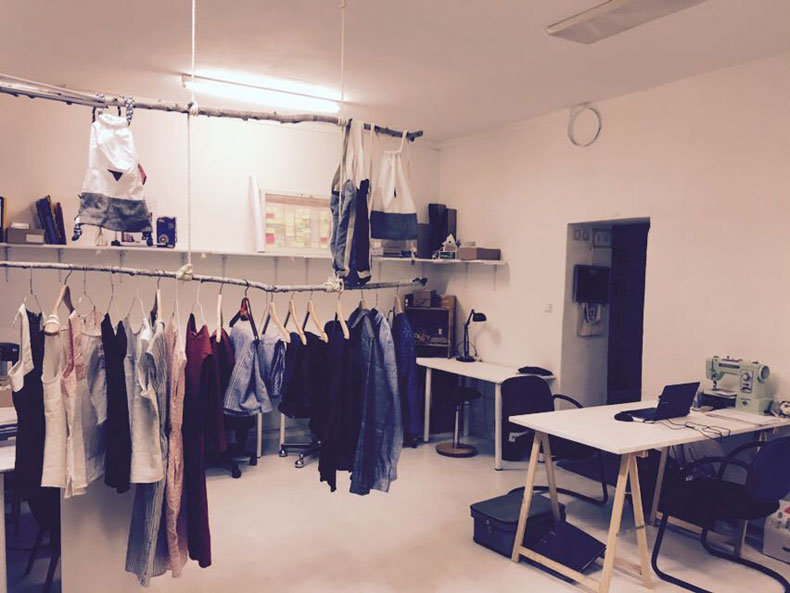
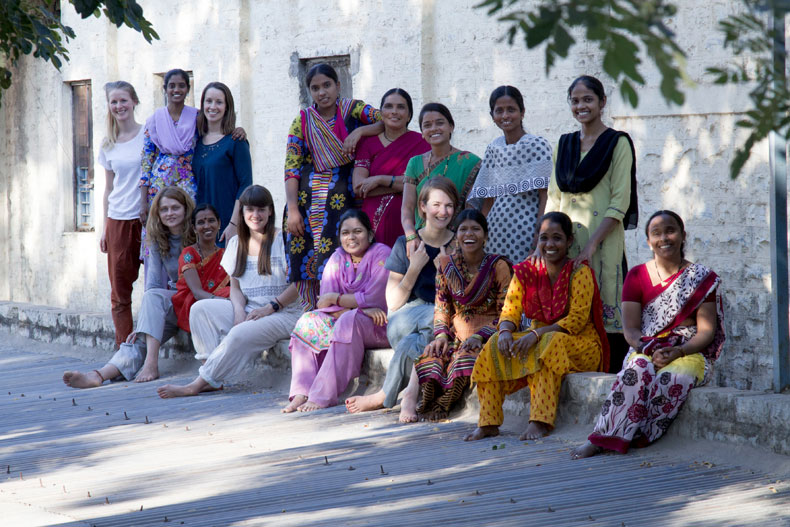
Dear Carolin, thank you so much for this interview! Honestly, I cannot find no words for your enormous commitment and take my off to you…
Janina won the 50 € coupon of Band of Rascals . Congratulations!
